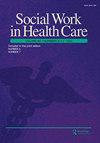The impact of psychosocial determinants of HbA1c level: Implications for social work care management.
IF 1.8
4区 社会学
Q1 SOCIAL WORK
引用次数: 0
Abstract
Diabetes impacts approximately 37.3 million Americans. The majority of HbA1c studies focused on independent variables while there are possibilities of some variables serving as an antecedent to other variables. Furthermore, most of the research has been skewed toward either objective or subjective data, thus overlooking the possible importance of the use of both data sources in tandem. As such, the purpose of this study is to investigate factors impacting glycated hemoglobin (HbA1c) levels both directly and indirectly with the use of both objective and subjective sources of information. The data are obtained from 2017 to 2018 National Health and Nutrition Examination Survey (NHANES). IBM SPSS Amos 29 was used for the purpose of structural equation modeling to investigate paths related to HbA1c levels. The finding shows that diets impact HbA1c levels directly and diet and exercise impact HbA1c indirectly through BMI. Diets alone can directly reduce HbA1c levels, but exercise alone cannot reduce HbA1c levels. Unexpectedly, socioeconomic construct does not have a direct impact on diet or exercise. However, as expected, the depression construct has a significant effect on both exercise and diet.HbA1c水平的社会心理决定因素的影响:对社会工作护理管理的影响。
糖尿病影响了大约3730万美国人。大多数HbA1c研究集中在自变量上,而有些变量可能是其他变量的前提。此外,大多数研究都偏向于客观或主观数据,从而忽略了同时使用这两种数据来源的可能重要性。因此,本研究的目的是利用客观和主观的信息来源,直接和间接地探讨影响糖化血红蛋白(HbA1c)水平的因素。数据来源于2017 - 2018年全国健康与营养检查调查(NHANES)。采用IBM SPSS Amos 29进行结构方程建模,研究与HbA1c水平相关的通路。研究结果表明,饮食直接影响HbA1c水平,饮食和运动通过BMI间接影响HbA1c水平。单独的饮食可以直接降低HbA1c水平,但单独的运动不能降低HbA1c水平。出乎意料的是,社会经济结构对饮食或运动没有直接影响。然而,正如预期的那样,抑郁结构对运动和饮食都有显著影响。
本文章由计算机程序翻译,如有差异,请以英文原文为准。
求助全文
约1分钟内获得全文
求助全文
来源期刊

Social Work in Health Care
SOCIAL WORK-
CiteScore
3.80
自引率
9.10%
发文量
25
期刊介绍:
Devoted to social work theory, practice, and administration in a wide variety of health care settings, this journal gives you the tools to improve your practice while keeping you up-to-date with the latest crucial information. Social Work in Health Care is edited by Gary Rosenberg, PhD, one of the most respected leaders in health social work. This creative, lively journal brings you the most important articles on research, leadership, clinical practice, management, education, collaborative relationships, social health policy, and ethical issues from the most respected experts in the field. The journal"s special issues comprehensively discuss a single pertinent health care theme.
 求助内容:
求助内容: 应助结果提醒方式:
应助结果提醒方式:


